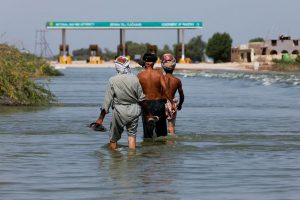projects worth $2.6 billion will begin Sindh’s flood restoration.
CDWP approves five plans and expects World Bank loans of $1.7 billion.

ISLAMABAD: Pakistan has approved the first round of five projects totaling $2.6 billion in estimated costs, including $1.7 billion in foreign loans that it hopes the World Bank will approve as soon as possible. These projects are for the reconstruction of flood-damaged areas and the restoration of livelihood.
All of the projects are situated in Sindh province, which was the hardest hit by the floods and suffered losses and damages totaling a staggering $20.4 billion. According to the Post Disaster and Need Assessment assessment, Sindh alone requires $7.9 billion out of the overall $16.3 billion in financing.
The largest project ever approved for Sindh by the Central Development Working Party (CDWP) is the Rs330 billion ($1.5 billion) Flood Response Emergency Housing project.
The body also approved the Sindh Water and Agriculture Transformation Project, which will cost Rs75 billion or $310 million, the Sindh Flood Emergency Rehabilitation Project, which will cost Rs49 billion or $275 million, and the Sindh Flood Emergency Rehabilitation Programme (SFERP), which will cost Rs66 billion or $300 million.
The CDWP also authorised the Sindh Human Capital Investment integrated health and population initiative for Rs57 billion ($256 million). This project only contains one element that is susceptible to flooding.
These programmes were approved by the CDWP to open the door for loan discussions with the World Bank the following month. According to a Planning Commission official, Pakistan hopes to receive World Bank loan approvals totaling about $1.7 billion in the first half of December.
Pakistan expressed its displeasure on Thursday at the donor community’s lack of concern for the suffering of 33 million people. The $816 million flash plea, which was exclusively intended for relief and rescue, has only received a half-hearted response from the world.
As the component of the additional new finance is not very significant at this point, the World Bank has also redirected some of the already approved loans toward flood-related operations.
The World Bank also announced plans to revoke loans totaling around $730 million in July because Pakistan had not repaid them. Some of these monies will now be used for flood-related activities, though.
Since the Sindh government included approximately Rs12 billion in costs under the heading of the non-governmental organization and also included the procurement of dozens of vehicles, several of the CDWP-approved projects require closer examination.
A committee has been established by the CDWP, which is led by Ahsan Iqbal, the planning minister, and Zafar Ali Shah, the planning secretary, to decide the requirements for these vehicles.
According to a representative of the Planning Ministry, the government would not be able to make any significant changes because its main coalition partner, the Pakistan Peoples Party, is in charge of the province.
Project for Emergency Housing
The largest Rs330 billion ($1.5 billion) project has been approved by the government of Sindh to aid families who have lost their homes. This project is being funded by a loan from the World Bank.
The effort intends to assist those affected by the flooding in all of Sindh’s districts. A $500 million loan from the World Bank may be made available for the 44-month project.
The project’s scope includes providing financial help, as well as supporting infrastructure, to 781,339 entirely damaged homes and 1.1 million partially damaged homes.
The owners of entirely destroyed homes will receive a financial grant from the Sindh government of Rs. 300,000, and owners of partially damaged homes would receive Rs. 100,000. The impacted population will get paid based on a method based on reached milestones, which will be examined by the NGOs or other contracted implementing bodies.
The government has suggested giving the NGO 4% of the award, which will equal Rs11.8 billion. According to the Planning Commission, “it is not justified and appears to be in duplicate with the allocation of consultation charges of Rs1.5 billion.”
Using SFERP
The $300 million SFERP project, which would restore livelihoods, infrastructure, and the province’s Rescue 1122 service, has also received government approval.
The initiative aims to increase food security, sustainable livelihood, and institutional resilience in various Sindh districts while also restoring roads, water supply, and damaged drainage systems.
The World Bank has allocated $270 million in assistance for the three-year period between 2022-2023 and 2024-2025.
SWAT endeavor
The $310 million (Rs75 billion) agriculture reform initiative was given the CDWP’s approval. This includes a loan from the World Bank for $275 million.
The project will enable a transition along the three dimensions, including agriculture, water resources, and the provision of water services, and assist in adjusting the role of government in agricultural and water management.
With a provision to help farmers with upcoming harvests in the form of seed, fertilizer, and land preparation, the initiative will also cater to the losses associated with the Flood of 2022.
The federal government has deemed the PC-intended I’s acquisition of up to 33 automobiles costing Rs126 million as unreasonable.
The Integrated Health and Population Programme, which is expected to cost Rs57 billion ($256 million), was approved by the CDWP. A loan of $200 million will be provided by the World Bank, while a loan of $50 million from the Islamic Development Bank (IDB) is also possible.
Through improved access to integrated reproductive, maternity, neonatal, child, and adolescent health and nutrition services, the project envisioned providing universal health coverage.
The Sindh government’s Strengthening of Social Protection Delivery System project, which will cost Rs48.3 billion, was also authorised.











































